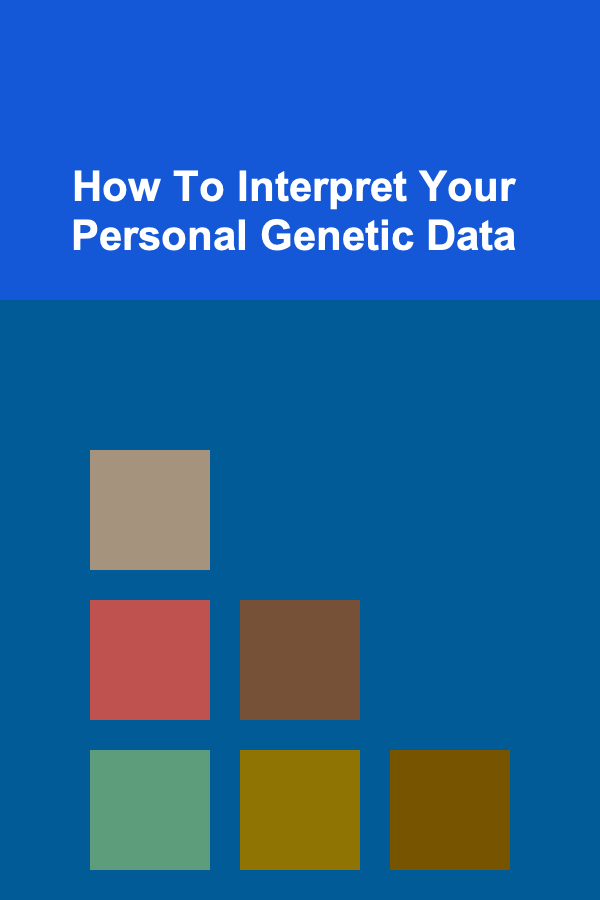
How To Interpret Your Personal Genetic Data
ebook include PDF & Audio bundle (Micro Guide)
$12.99$9.99
Limited Time Offer! Order within the next:

Genetic testing has become increasingly popular, offering people the opportunity to explore their DNA and gain insights into their health, ancestry, and potential predispositions to various conditions. Whether through direct-to-consumer services like 23andMe or AncestryDNA, or more medically oriented tests from healthcare providers, individuals now have unprecedented access to their genetic information.
However, interpreting personal genetic data isn't straightforward. While genetic testing provides raw data---strings of sequences composed of adenine (A), thymine (T), cytosine (C), and guanine (G)---the true meaning behind this data requires scientific understanding. Genetic data interpretation goes beyond simply knowing which genes you have; it involves understanding what these genes do, how they influence your body, and what environmental or lifestyle factors can modify their effects.
This article will explore how to interpret your personal genetic data, focusing on how to understand the information, how to use it responsibly, and how it fits into your overall health and lifestyle decisions.
Understanding Your Genetic Data
The Basics of DNA and Genes
At its core, your genetic data is made up of DNA, the molecular blueprint for your body. DNA is a long molecule that carries genetic information in the form of sequences. These sequences are divided into genes, which are instructions for building proteins that perform essential functions in your body.
- DNA consists of two strands coiled into a double helix. The sequence of chemical bases (A, T, C, and G) forms the genetic code.
- Genes are specific sequences of DNA that provide instructions for producing proteins.
- Chromosomes are structures in the cell that contain most of your DNA. Humans have 23 pairs of chromosomes.
Each gene plays a role in determining specific traits, such as eye color, blood type, or susceptibility to certain diseases. However, the vast majority of your traits and health outcomes are influenced by interactions between multiple genes and environmental factors. This complexity is why interpreting genetic data is not as simple as reading a list of traits or diseases.
Genetic Variants: SNPs and Other Changes
When analyzing your genetic data, you may come across terms like single nucleotide polymorphisms (SNPs). SNPs are the most common type of genetic variation among people, occurring when a single nucleotide in the DNA sequence is altered. These variations can be linked to various traits or health conditions. For example, an SNP may influence your risk for a particular disease or how your body metabolizes certain foods or medications.
Understanding whether a variant is benign (harmless) or pathogenic (harmful) requires scientific knowledge, as not all genetic variations cause disease. Furthermore, many traits are influenced by combinations of multiple SNPs and environmental factors, making it difficult to predict outcomes with certainty.
Genetic Testing Results: What You'll Find
Depending on the testing service, your genetic data report might include several different types of information:
- Ancestry Information: Many tests offer insight into your ethnic background and genetic ancestry, breaking down your origins by geographic regions or populations.
- Health Risk Reports: These reports highlight your predisposition to certain diseases, such as cancer, heart disease, or Alzheimer's. The report might reference genetic mutations or variants that have been associated with these conditions in scientific studies.
- Carrier Status: Some tests can tell you whether you are a carrier for certain inherited conditions, such as cystic fibrosis or sickle cell anemia. This information is important if you plan to have children, as carriers can pass these conditions on to their offspring.
- Pharmacogenomics: This part of the report might indicate how your genes affect your response to medications, helping to tailor medical treatments that are more effective or have fewer side effects.
- Traits: These reports provide information on less health-related traits, such as hair color, eye color, or whether you're likely to have a sweet tooth.
While this information can be insightful, it is important to understand its limitations and the nuances of genetic data.
How To Interpret Your Genetic Data
Step 1: Understand the Limitations
Genetic data interpretation is complex, and results should be viewed with caution. Here are some of the key limitations to keep in mind:
- Not Deterministic: Most genetic tests do not provide a definitive "yes" or "no" answer to whether you will develop a certain disease. Instead, they typically provide risk estimates based on the presence of certain genetic variants. This means that even if you have a genetic variant associated with a condition, it doesn't guarantee that you will develop the condition.
- Gene-Environment Interactions: Your health is influenced not only by your genes but also by your environment and lifestyle. For example, having a genetic predisposition to obesity does not mean you will inevitably become obese; factors such as diet, exercise, and other behaviors play a significant role in determining your health.
- Variants of Unknown Significance: Not all variants have been studied enough to understand their effects fully. Some genetic tests report variants for which the clinical significance is still uncertain. In such cases, it's essential to consult with a healthcare provider or genetic counselor.
- Complexity of Diseases: Many health conditions are polygenic, meaning they are influenced by multiple genes. Genetic tests often look at only a few variants that might be linked to these conditions. Therefore, the absence of a variant does not mean you are free from the disease, and the presence of one does not mean you will necessarily develop it.
Step 2: Focus on the Most Relevant Results
When reviewing your genetic test results, it's helpful to focus on the areas that are most relevant to you. This will depend on your personal health goals and family history. Some people are more concerned about their risk for hereditary diseases, while others may be more interested in understanding their ancestry or optimizing their lifestyle through pharmacogenomic insights.
- Health Risk Reports: If you're particularly concerned about a certain health condition, such as heart disease or diabetes, focus on the genetic variants that are associated with those conditions. Be mindful that these reports often involve risk factors rather than definitive diagnoses.
- Carrier Status: If you're planning to have children, understanding your carrier status for inherited conditions is crucial. It can help you make informed decisions about family planning and genetic counseling.
- Pharmacogenomic Information: If you're on medication, knowing how your body metabolizes certain drugs based on your genetic makeup could help optimize your treatment plan. For example, some people metabolize drugs like caffeine or blood thinners faster than others, and genetic data can offer insights into how you should adjust your medication regimen.
- Traits: These results can be fun and interesting, but they don't usually have a significant impact on your health. They provide a glimpse into some of the more minor aspects of your genetic makeup, such as whether you might have a tendency to be a morning person or whether you're likely to have a certain taste preference.
Step 3: Consider Professional Guidance
If you're unsure about how to interpret the findings or how they relate to your health, it's a good idea to consult a genetic counselor or healthcare provider. Genetic counselors are trained to help you understand your genetic test results in the context of your personal health history, family history, and lifestyle. They can also help you navigate decisions such as whether to undergo further testing or make changes to your lifestyle.
Additionally, doctors can provide guidance on how genetic testing results might influence your medical care. They can incorporate the information into a personalized health plan, recommend preventive measures, and offer advice on managing risk factors.
Step 4: Use Your Data to Make Informed Decisions
Ultimately, the goal of genetic testing is to empower you to make informed decisions about your health and lifestyle. Here are a few ways you can use your genetic data:
- Preventive Health Measures: If your genetic test indicates a predisposition to a certain disease, you can work with your doctor to develop a preventive plan. This might involve regular screenings, changes in diet, or increased physical activity.
- Tailoring Your Lifestyle: Your genetic data can provide insights into areas where you might benefit from specific lifestyle changes. For instance, if you have a genetic variant that affects your cholesterol metabolism, a diet low in saturated fats might be recommended.
- Family Planning: Understanding your carrier status and the genetic conditions in your family can help you make informed decisions about reproduction and whether genetic counseling is necessary.
- Optimizing Medication: Your pharmacogenomic data can help ensure that you're using medications that are more likely to be effective for your genetic profile, reducing the risk of side effects and improving treatment outcomes.
Step 5: Stay Updated
Genetic science is rapidly advancing, and the understanding of how specific genetic variants influence health is constantly evolving. As new research emerges, your genetic data could provide new insights. Many genetic testing companies update their reports based on the latest scientific findings, so it's worth revisiting your results periodically to see if any new information becomes available.
Ethical Considerations and Privacy
Before undergoing genetic testing, it's important to consider the ethical implications and privacy concerns associated with sharing your genetic data. Genetic data is personal and sensitive information, and it can reveal details about your health, ancestry, and even potential risks to your family members.
- Data Privacy: Ensure that the testing company has strong data protection policies and will not share your genetic data without your consent.
- Ethical Concerns: Consider how you would feel if you discovered a genetic predisposition to a serious condition. Would you want to know, or would you prefer not to? Would you share your results with family members who might also be affected?
Conclusion
Interpreting your personal genetic data requires a careful, informed approach. While genetic testing can provide valuable insights into your health, it's important to understand the limitations and complexities of the results. Genetic testing is just one piece of the puzzle---your overall health is shaped by a combination of genetics, lifestyle, and environmental factors. By understanding your genetic data in the proper context and consulting with healthcare professionals when needed, you can make empowered, informed decisions about your health and well-being.

Building a Strong Compliance Culture in the Workplace
Read More
How to Invest in REITs (Real Estate Investment Trusts) for Steady Cash Flow
Read More
How to Sell Digital Products Successfully for Developers
Read More
How to Set Up a Checklist for Managing Your Health and Medications While Traveling
Read More
How to Use a Budget App to Track Spending Effectively
Read More
How To Minimize Sun Damage with Prevention
Read MoreOther Products

Building a Strong Compliance Culture in the Workplace
Read More
How to Invest in REITs (Real Estate Investment Trusts) for Steady Cash Flow
Read More
How to Sell Digital Products Successfully for Developers
Read More
How to Set Up a Checklist for Managing Your Health and Medications While Traveling
Read More
How to Use a Budget App to Track Spending Effectively
Read More